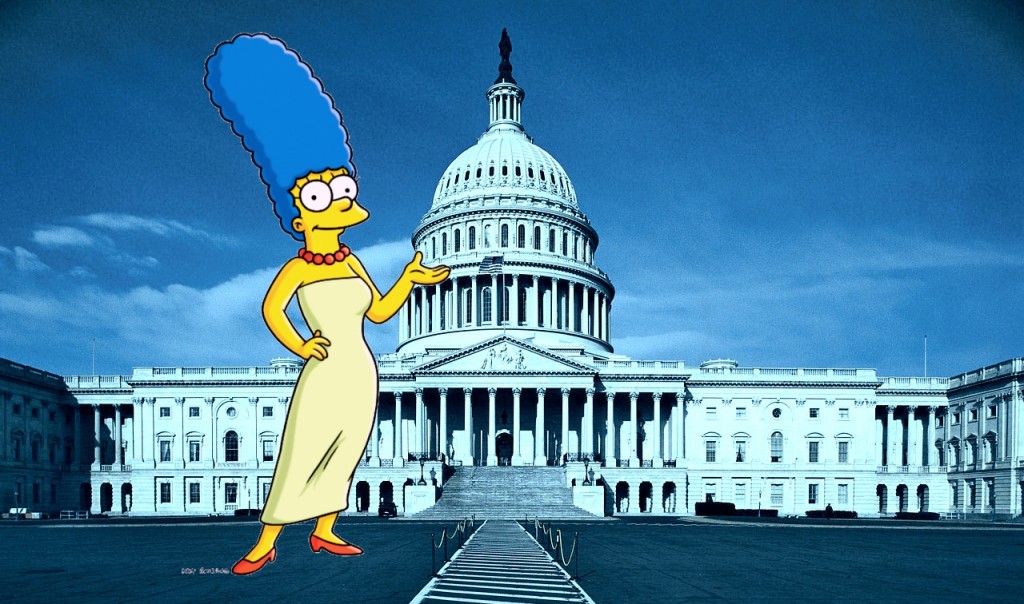-
Recent Posts
- Better Call Saul: There Are No Happy Endings between a “Rock and Hard Place”
- Black Widow Keeps It in the Family for Natasha’s Last Ride
- Loki Finds New Purpose in the Man behind the Mischief
- In its Debut, Star Wars: The Bad Batch Decides Whether to Obey or Rebel
- Nomadland: A Film Out of Time, For Our Times
Archives
Recent Comments
Meta
Tag Archives: Politics
A Brief History of Marge Simpson Versus Washington
You may think it’s a sign of our perpetually insane times that a member of the Trump administration somehow managed to kick up a feud with a cartoon character. Nevertheless, Trump’s Senior Legal Adviser, Jenna Ellis, recently tweeted that Democratic VP candidate Kamala Harris “sounds like Marge Simpson.” This prompted Marge, ever the consummate (albeit imaginary) professional, to issue a polite but cutting response, criticizing Ellis for resorting to name-calling, something she discourages in her young children, and for disrespecting suburban housewives.
That might seem like the latest bizarre cut from the never-ending “greatest hits” of 2020. But The Simpsons, and Marge in particular, have long found themselves entangled with real life political figures, most of whom, like Ellis, underestimated just who they were messing with.
Veep’s Series Finale and the Hollowness of Getting What You Want

“What did it cost you?” “Everything.”
It’s undoubtedly silly to try to draw too sharp a line between Veep’s series finale and Avengers: Infinity War, But for those of us steeped in both, it’s also awfully hard to disaggregate them. Selina Meyer is not Thanos, despite their parallel, all-consuming quests and shared status as snappy dressers. Selina’s goal is much more one of direct personal ambition, in contrast to Thanos’s faux-altruistic aims (and hers has a much lower body count to boot). And yet the costs, at least in a spiritual sense, are the same.
Posted in Other Sitcoms, Television
Tagged Episode Reviews, Julia Louis-Dreyfus, Politics, Veep
1 Comment
What The Simpsons Taught Us About Standing Up to Billionaires

In the opening of “Last Exit to Springfield”, one of The Simpsons’ most celebrated episodes, Homer and Bart watch a scene from the latest McBain shoot-em-up. It ends with McBain’s dastardly antagonist Mendoza laughing maniacally, having felled his adversary with a poisoned salmon puff. Bart is aghast at such villainy, but Homer reassures his son that “there’s nobody that evil in real life.” Then, in one of the show’s trademark subversions, the episode immediately cuts to Mr. Burns, who is laughing exactly as maniacally at an imperiled window washer who’s dangling just outside his office.
The lesson is clear. As much as we may wish our most fearsome of foes were confined to celluloid and pixels, sometimes the art that holds a mirror up to nature can reflect our reality with a disquieting accuracy. More to the point, given that long ago The Simpsons itself had already depicted a wealthy businessman running for office against an experienced civil servant while railing against the establishment; since it had already shown a former TV star and political outsider (with awful, awful hair) defeating an incumbent through his use of media-friendly bombast; and considering the show even went so far as to posit a future where a newly elected Lisa Simpson would inherit a budget crunch from President Trump, perhaps we should start paying closer attention to its predictions.
But The Simpsons doesn’t just provide, as Kent Brockman puts it, “a chilling vision of things to come.” It also offers guidance. While no one should aim to look, think, or act like Homer Simpson, episodes like “Last Exit to Springfield” shine a light on the way regular people can find themselves emboldened by circumstance and demonstrates how we unwashed masses can stand up to the plutocratic figureheads who might threaten to take away the things we need and hold dear.
Posted in Television, The Simpsons
Tagged Homer Simpson, Mr. Burns, Politics, The Simpsons Season 4
Leave a comment
The Simpsons is Anti-Institutions but Pro-Comedy in “Sideshow Bob Roberts”

The political leanings of The Simpsons are surprisingly hard to pin down. As I discussed with Matt and Robbie on The Simpsons Show Podcast, the natural impulse is to take the series as a left-leaning show. In creator Matt Groening’s Life in Hell comic strip (the primogenitor of The Simpsons) Groening wears his liberal bent on his sleeve. Springfield’s most prominent moment in the “culture wars” of the early 90s culminated in a real life kerfuffle with President George H.W. Bush, which was immortalized in “Two Bad Neighbors”. And the show in general has a propensity to take the stuffing out of anything revered or traditional.
On the other hand, Springfield has a corrupt, sleazy, largely ineffectual mayor who’s a page ripped out of the Kennedy family tome. The show has featured Bill Clinton hitting on Marge and describing himself as “a pretty lousy President.” And The Simpsons is still one of the few shows on television to depict its main characters regularly going to church and emphasizing family values, however fractured the show’s take on those values may be.
The easy answer then, and the one offered by the show’s ambassadors when questioned, is that The Simpsons is an equal opportunity source of satire, plenty willing to get its licks in on both sides of the aisle. While that’s true in a general sense, I believe the show still represents a particular political worldview, at least to the extent that a series which has had so many cooks walk through the doors of its kitchen can be said to have a single perspective.
Posted in Television, The Simpsons
Tagged Episode Reviews, Politics, Sideshow Bob, The Simpsons S06E05, The Simpsons Season 6
Leave a comment
In Defense of The West Wing‘s Season 5

I started watching The West Wing as part of a trade. I agreed to watch the show, one of my wife’s favorites, as long as we would alternate with episodes of Star Trek: The Next Generation, one of mine. And while the pairing seems odd on the surface, the shows have a surprising amount in common. Both center around a clear leader, supported by a cadre of his most trusted advisors, each with their own relevant backgrounds and specialized roles. In both series, a typical episode features the team facing what amounts to a crisis of the week, buoyed by loose arcs and character development, using these stories to comment on politics and society.
I grew to truly enjoy The West Wing, but it also hit some of the same speed bumps that its space-bound counterpart did. While I suspect that I will always be more partial to Star Trek: The Next Generation, as it’s buoyed by the affection and nostalgia of youth, the show is not beyond criticism. One of the series’s most glaring flaws was mandated by the father of Star Trek himself, Gene Roddenberry. In Next Generation’s early years, Roddenberry forbid the show’s writers from having the main characters meaningfully disagree or genuinely argue with each other. Sure, there could be the occasional spirited debate, but it was all conducted with an undercurrent of collegiality and mutual respect. All real conflicts and threats were required to be external. That dictate was part of Roddenberry’s central vision for his “wagon train to the stars” universe. He wanted to present an optimistic view of the future, where mankind had evolved beyond such trivialities as money or prejudice or petty disagreements.
Posted in Other Prestige Dramas, Television
Tagged Aaron Sorkin, Parks and Recreation, Politics, Star Trek, The West Wing
11 Comments

